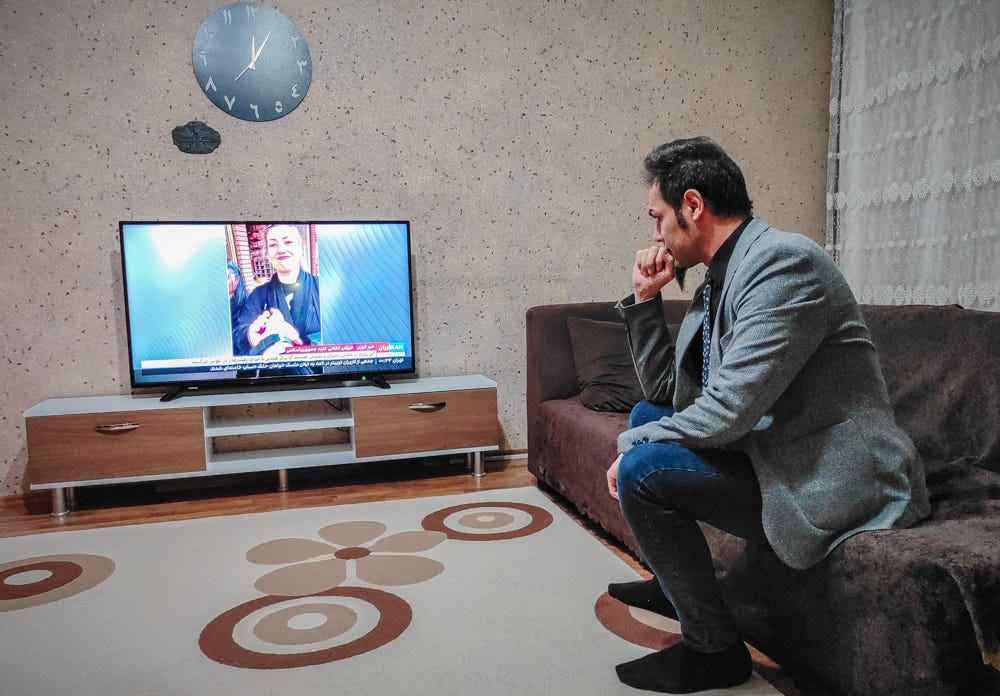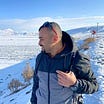Iranian journalist Ali Amir Heidari has been living in Turkey under temporary protection for more than three years. In September, when nationwide protests began in his home country, Heidari said he experienced a sharp rise in online harassment.
"[The Iranian regime] lost control of the country and turned to threats and intimidation,” Heidari told Turkey recap. “They don’t want journalists to continue their activities even outside Iran. They try to prevent the free flow of information by creating fear.”
Iranian state pressure on journalists inside and outside the country is not new. Yet with rising online harassment this fall, and recent attempts to kidnap Iranian dissidents in Turkey, dozens of journalists and activists taking refuge on this side of the border feel increasingly at risk.
Masud Akhtarani Tehrani, another journalist living in Turkey after publishing critical reports on the Iranian regime, noted a similar rise in targeted online threats, which involve references to abduction and execution.
"My people are fighting against the tyranny of the Islamic Republic," Tehrani said. He added that as a journalist, he and his colleagues felt obligated to inform the world about what’s happening in Iran, but this "responsibility," as he described it, came with challenges.
Iran has long been one of the world's most repressive countries for journalists, and the state attempts to control news and information are constant. According to Reporters Without Borders (RSF), at least 1,000 journalists and media workers have been arrested, jailed, subjected to enforced disappearance or executed by the Iranian authorities since the 1979 revolution.
RSF notes both professional and non-professional journalists are targeted with intimidation, arbitrary arrests and lengthy jail sentences imposed by revolutionary courts in unfair trials. Iran ranked 178 out of 180 countries in RSF's 2022 World Press Freedom Index.
According to the Committee to Protect Journalists (CPJ), at least 37 members of the press have been arrested since the start of the latest protests, which began after Mahsa Amini, a 22-year-old Kurdish woman, died in police custody after being detained for allegedly violating a hijab law on Sept. 13.
In high profile arrests, Iranian authorities charged two female journalists, Niloufar Hamedi and Elaheh Mohammadi, with espionage after they provided key reporting on Amini's death for Iranian newspapers.
Watching the events unfold from Turkey, journalist Aliasghar Kourosh Zemani, who left Iran in 2014 after receiving a whipping sentence, said the regime seeks to control media in the country.
“All broadcast media is dependent on the government,” Zemani told Turkey recap. “They give a scenario. 'Share them,' they say, and it is shared. It's like a movie. The media is in their hands, just like the power and the money.”
After suspecting he was being followed in Turkey, Zemani took a four-year break from journalism. He returned to the profession in 2018 and currently writes articles for newspapers based in London and presents a TV show on the Bayan network in the UK.
"Many journalists who left Iran have either disappeared or been kidnapped," Zemani claimed. "We are still afraid of the regime in Turkey. Leaving Iran provided us only with temporary safety, but the fear remains."
Ruhollah Zam was one Iranian journalist who couldn't escape the regime's threats after leaving the country. Zam, who was living in exile in France, was detained by Islamic Revolutionary Guard Corps (IRGC) after traveling to Iraq in 2019. He was then brought to Iran and hanged a year later.
Another Iranian journalist, Arash Shoashargh, who was sentenced to lashes for opposing the Iranian regime, disappeared in Van in 2018. Months later, authorities revealed that Shoashargh was in prison in Iran. Zamani said he was a friend of both journalists.
Heidari, who has been working for various media organizations broadcasting in Farsi, such as Voice of America (VOA), Andishe TV, Radio Farhang Gutenberg, Iran International, and Afghanistan International TV, said Iran targets not only journalists but also institutions.
"The authorities declared all Iranian international TV network personnel terrorists," Heidari said.
In addition, the journalists who spoke to Turkey recap said threats against them are often extended to their family members back home. Tehrani, who currently works with Amad News and DORR TV and produced a documentary on the regime's repression as well as the past protests in the country, said his family in Iran continues to be targeted.
"My family and relatives were arrested in recent months, especially during the protests," he said. "After I left the country, the Islamic Republic of Iran repeatedly tried to make reports against me and also published false reports about my detention abroad in the security news agency, Fars."
Social media networks are the most used medium for threatening the journalists, who said they are called from unknown numbers and sent images with violent content. Interviewed journalists also said they were threatened with death on these networks, both in voice and text messages.
When the number of threats spiked this fall, Tehrani said he filed a complaint with the local Office of the Chief Public Prosecutor in Turkey.
All Iranian journalists interviewed by Turkey Recap said they wanted to leave Turkey and go to a country where they would feel safer. Together, they also sent letters to Pres. Recep Tayyip Erdoğan as well as national and international media outlets explaining the challenges they faced.
According to Zemani, the group has yet to receive a response from the Presidency and other institutions that received the letter, such as the International Federation of Journalists (IFJ), the Journalists' Union of Turkey (TGS) and RSF.
"Why don't they hear us? Who will if they don't hear our voice?" Zemani asked.
"We are regularly threatened with death in Turkey," Tehrani said. "Threats and risks also prevent us from fully focusing and accurately reflecting on current events. My colleagues and I need security and support to do our job properly."
TGS representatives contacted by Turkey Recap said they received the letter mentioned above. They noted it was addressed to the Presidency so they weren’t sure how to help, adding they “want to get to know the journalists and help them” before they requested contact information.
RSF officials also confirmed that they received the letter and conveyed it to the institution's headquarters.
The Consulate General of Iran in Erzurum, which Turkey recap contacted regarding the threat allegations, stated that they could neither accept nor reject the claims.
Borzou Daragahi, an Iranian-American correspondent for the Independent and a member of The Foreign Media Association (FMA) in Turkey, said the regime deals with journalists according to their work.
"If you're a commentator or analyst, even if you say something very harsh, nothing may happen to you," Daragahi told Turkey recap. "Recently, there was a talk show on state TV, a reformist versus a conservative cleric. The reformist said some very harsh things. You can say these things, but what you can't do is delve deeper into things. That's what's going to get you in trouble.”
According to Daragahi, Iranian authorities pay most attention to whether journalists have concrete information they can share. Daragahi said he didn’t believe Iranian authorities were overly concerned with average journalists.
"What they care about is [when] people with access go abroad," he said. "If those people – they can call themselves journalists, defectors, or activists – were once part of the team, 'khodi' in Farsi, and they decided [to defect] and become 'gheyr e khodi,' the regime would try to hunt them."
Regarding Iranian journalists in Turkey, Daragahi said, "If they did not have access to state secrets, I don't think anything would happen just because they were part of the movement."
He continued, “I think it's a good thing from the regime's point of view that they left the country. 'Let them live abroad,' they think. It's better for the regime to have real journalists abroad rather than in the country."
This report was produced by Turkey recap with support from the Heinrich Böll Foundation in Turkey and the IPS İletişim Vakfı.
Turkey recap is an independent platform supported by readers via Patreon, where members get access to our back channel, news tracking tools, calendar and more.
If you liked this report, subscribe here or forward it to a friend. Send us feedback, pitches and requests. We’re working to grow this platform: info@turkeyrecap.com.
Diego Cupolo, co-founder + editor @diegocupolo
Verda Uyar, freelance journalist @verdauyar
Ingrid Woudwijk, freelance journalist @deingrid
Gonca Tokyol, freelance journalist @goncatokyol
Batuhan Üsküp, editorial intern @batuskup





